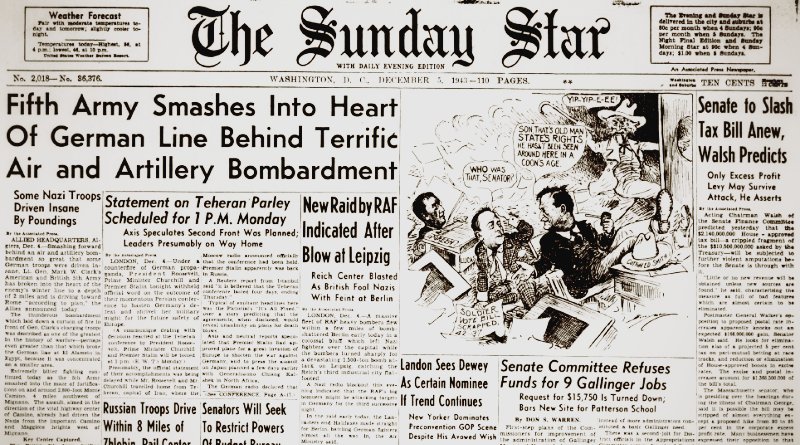World War II Chronicle: December 5, 1943
Click here for TODAY’S NEWSPAPER
Since the Chronicle began I have encountered scores of stories on marooned airmen drifting across the Pacific Ocean for weeks. Apart from a Dutch submariner that swam for several days straight at the beginning of the war I haven’t read any of them until now. Today’s paper (page seven) features a story of four Navy fliers who ran out of fuel and spent 16 days adrift.
This is one of those experiences that no one can appreciate without having lived through it. These men scrounged some food and water from their sinking aircraft, but they had no idea on their first day whether friendly forces would find them quickly, the Japanese would capture them, or if they would die from exposure or lack of food and water. They limited themselves to one malted milk tablet each per day. I had never heard of malted milk besides Whoppers candy, but it consisted of malted barley, wheat flour, and powdered milk. These tablets provided good nutritional value while being lightweight and had a long shelf life. K-rations included 15 tablets for one soldier’s meal, so you can imagine how little sustenance these men got from just one tablet per day.
The article mentions their hands being blackened from sun exposure — apart from clouds there’s absolutely no shade on the ocean. Sunburns are horrible, but imagine having no means to stop the sunburn, plus salt from the ocean making everything worse. Pain from that, pounding headaches from dehydration, stomach in knots from no food… sleep was probably close to impossible for these men.
Dehydration will kill more quickly than lack of food, and they did manage to trap enough rainwater. I feel the main issue would be keeping your sanity. Praying together certainly helped (and probably accounted for these men having everything they needed), but imagine being in their shoes and seeing island after island drift by with no chance of reaching shore. Even if they did reach land, would there be anything to eat? Or could they become food for cannibals? They did come close to an island which was the site of a battle, and they came across enough drifting supplies to regain their strength and paddle throughout the day to reach land. They were out of the frying pan and into the fire though; they had to evade Japanese forces and managed to find islanders that managed to return them to friendly lines.
It makes me wonder though, how many of these types of stories will we never hear of because one man ate everyone else’s food? While not everyone succumbs to our survival instincts, plenty of people will (think of a drowning person instinctively pushing their would-be rescuer underwater just to keep their own head above water). Plus many of us are surrounded by wicked people today; you probably know someone who would want to kill one of the weaker men so there was more food and water to go around. Or how many times did men spend weeks at sea only to be picked up by the Japanese or unfriendly natives (page 32 has a story of a C-47 pilot who had a close call with native headhunters), never to be heard from again?
Lt. Gen. Alexander A. Vandegrift explains why the tiny island of Guadalcanal was vital to American strategy on page 24. A story on the same page tells of the different ingenious ways troops have used bulldozers to close in and kill the enemy in combat… Sports begins on page 27…
Naval Academy head football coach and athletic director John E. “Billick” Whelchel is shipping out for sea duty in the Pacific. Whelchel was Maj. Swede Larsen’s backfield coach but took over as head coach after the 1941 season, compiling a 13-5 record which includes two shutout victories over Army. He will command the heavy cruiser USS San Francisco later in the war and goes on to coach the Washington Redskins in 1949. Whelchel’s maternal grandfather was Confederate general James Longstreet.
Evening star. (Washington, D.C.), 5 December 1943. Chronicling America: Historic American Newspapers. Lib. of Congress.
https://chroniclingamerica.loc.gov/lccn/sn83045462/1943-12-05/ed-1/
